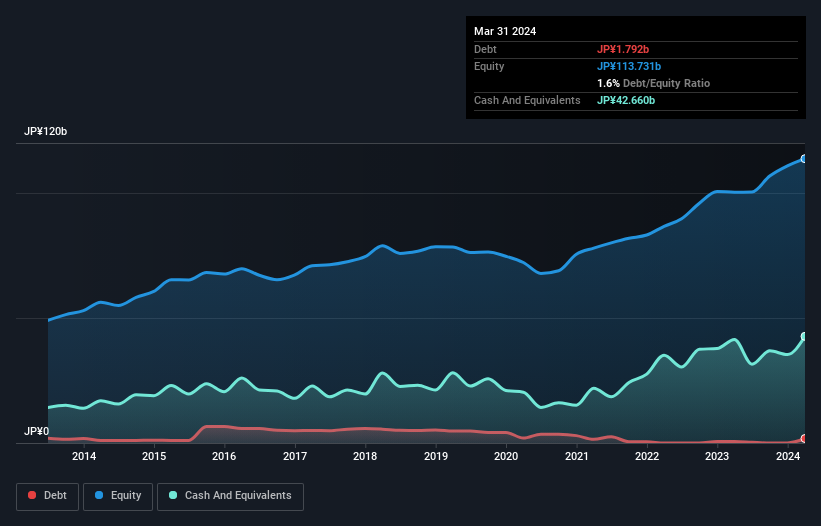David Iben put it well when he said, 'Volatility is not a risk we care about. What we care about is avoiding the permanent loss of capital.' It's only natural to consider a company's balance sheet when you examine how risky it is, since debt is often involved when a business collapses. Importantly, Descente Ltd. (TSE:8114) does carry debt. But the real question is whether this debt is making the company risky.
When Is Debt Dangerous?
Generally speaking, debt only becomes a real problem when a company can't easily pay it off, either by raising capital or with its own cash flow. If things get really bad, the lenders can take control of the business. However, a more usual (but still expensive) situation is where a company must dilute shareholders at a cheap share price simply to get debt under control. Of course, the upside of debt is that it often represents cheap capital, especially when it replaces dilution in a company with the ability to reinvest at high rates of return. When we examine debt levels, we first consider both cash and debt levels, together.
See our latest analysis for Descente
What Is Descente's Net Debt?
As you can see below, at the end of March 2024, Descente had JP¥1.79b of debt, up from JP¥551.0m a year ago. Click the image for more detail. But on the other hand it also has JP¥42.7b in cash, leading to a JP¥40.9b net cash position.

How Healthy Is Descente's Balance Sheet?
The latest balance sheet data shows that Descente had liabilities of JP¥26.5b due within a year, and liabilities of JP¥10.0b falling due after that. Offsetting these obligations, it had cash of JP¥42.7b as well as receivables valued at JP¥16.8b due within 12 months. So it can boast JP¥22.9b more liquid assets than total liabilities.
This surplus suggests that Descente has a conservative balance sheet, and could probably eliminate its debt without much difficulty. Succinctly put, Descente boasts net cash, so it's fair to say it does not have a heavy debt load!
Also good is that Descente grew its EBIT at 12% over the last year, further increasing its ability to manage debt. When analysing debt levels, the balance sheet is the obvious place to start. But ultimately the future profitability of the business will decide if Descente can strengthen its balance sheet over time. So if you're focused on the future you can check out this free report showing analyst profit forecasts.
Finally, a business needs free cash flow to pay off debt; accounting profits just don't cut it. Descente may have net cash on the balance sheet, but it is still interesting to look at how well the business converts its earnings before interest and tax (EBIT) to free cash flow, because that will influence both its need for, and its capacity to manage debt. Happily for any shareholders, Descente actually produced more free cash flow than EBIT over the last three years. That sort of strong cash conversion gets us as excited as the crowd when the beat drops at a Daft Punk concert.
Summing Up
While it is always sensible to investigate a company's debt, in this case Descente has JP¥40.9b in net cash and a decent-looking balance sheet. The cherry on top was that in converted 126% of that EBIT to free cash flow, bringing in JP¥4.4b. So we don't think Descente's use of debt is risky. Above most other metrics, we think its important to track how fast earnings per share is growing, if at all. If you've also come to that realization, you're in luck, because today you can view this interactive graph of Descente's earnings per share history for free.
When all is said and done, sometimes its easier to focus on companies that don't even need debt. Readers can access a list of growth stocks with zero net debt 100% free, right now.
New: Manage All Your Stock Portfolios in One Place
We've created the ultimate portfolio companion for stock investors, and it's free.
• Connect an unlimited number of Portfolios and see your total in one currency
• Be alerted to new Warning Signs or Risks via email or mobile
• Track the Fair Value of your stocks
Have feedback on this article? Concerned about the content? Get in touch with us directly. Alternatively, email editorial-team (at) simplywallst.com.
This article by Simply Wall St is general in nature. We provide commentary based on historical data and analyst forecasts only using an unbiased methodology and our articles are not intended to be financial advice. It does not constitute a recommendation to buy or sell any stock, and does not take account of your objectives, or your financial situation. We aim to bring you long-term focused analysis driven by fundamental data. Note that our analysis may not factor in the latest price-sensitive company announcements or qualitative material. Simply Wall St has no position in any stocks mentioned.
About TSE:8114
Descente
Manufactures and sells and related products in Japan and internationally.
Flawless balance sheet with proven track record.
Market Insights
Community Narratives



